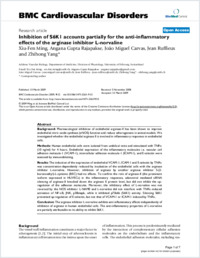Inhibition of S6K1 accounts partially for the anti-inflammatory effects of the arginase inhibitor L-norvaline
- Ming, Xiu-Fen Vascular Biology, Department of Medicine, Division of Physiology, University of Fribourg, Switzerland
- Rajapakse, Angana Gupta Vascular Biology, Department of Medicine, Division of Physiology, University of Fribourg, Switzerland
- Carvas, João Miguel Vascular Biology, Department of Medicine, Division of Physiology, University of Fribourg, Switzerland
- Ruffieux, Jean Vascular Biology, Department of Medicine, Division of Physiology, University of Fribourg, Switzerland
- Yang, Zhihong Vascular Biology, Department of Medicine, Division of Physiology, University of Fribourg, Switzerland
-
2009
Published in:
- BMC Cardiovascular Disorders. - 2009, vol. 9, no. 1, p. 12
English
Background: Pharmacological inhibition of endothelial arginase-II has been shown to improve endothelial nitric oxide synthase (eNOS) function and reduce atherogenesis in animal models. We investigated whether the endothelial arginase II is involved in inflammatory responses in endothelial cells. Methods: Human endothelial cells were isolated from umbilical veins and stimulated with TNFα (10 ng/ml) for 4 hours. Endothelial expression of the inflammatory molecules i.e. vascular cell adhesion molecule-1 (VCAM-1), intercellular adhesion molecule-1 (ICAM-1), and E-selectin were assessed by immunoblotting. Results: The induction of the expression of endothelial VCAM-1, ICAM-1 and E-selectin by TNFα was concentration-dependently reduced by incubation of the endothelial cells with the arginase inhibitor L-norvaline. However, inhibition of arginase by another arginase inhibitor S-(2-boronoethyl)-L-cysteine (BEC) had no effects. To confirm the role of arginase-II (the prominent isoform expressed in HUVECs) in the inflammatory responses, adenoviral mediated siRNA silencing of arginase-II knocked down the arginase II protein level, but did not inhibit the up-regulation of the adhesion molecules. Moreover, the inhibitory effect of L-norvaline was not reversed by the NOS inhibitor L-NAME and L-norvaline did not interfere with TNFα-induced activation of NF-κB, JNK, p38mapk, while it inhibited p70s6k (S6K1) activity. Silencing S6K1 prevented up-regulation of E-selectin, but not that of VCAM-1 or ICAM-1 induced by TNFα. Conclusion: The arginase inhibitor L-norvaline exhibits anti-inflammatory effects independently of inhibition of arginase in human endothelial cells. The anti-inflammatory properties of L-norvaline are partially attributable to its ability to inhibit S6K1.
- Faculty
- Faculté des sciences et de médecine
- Department
- Département de Médecine
- Language
-
- English
- Classification
- Biological sciences
- License
-
License undefined
- Identifiers
-
- RERO DOC 13062
- DOI 10.1186/1471-2261-9-12
- Persistent URL
- https://folia.unifr.ch/unifr/documents/301390
Statistics
Document views: 110
File downloads:
- pdf: 154
